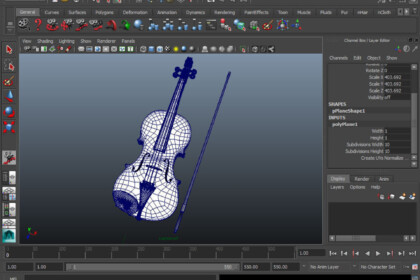
Projects & Materials

Augmented Reality That's Out of This World

At the Massachusetts STEM Summit, a student from Mashpee demonstrates her work, holding an iPad up to a picture of a violin.
An application in the photo links to a video of the instrument playing, the bow moves across the violin and music plays—a violin solo in the middle of the exhibit hall.
She and other Mashpee students presented their work at the DCU Center in Worcester in October. The work they showed off, all part of “Project Based Learning through 3-D Design, Printing and Manufacturing,” highlighted an array of student-made products. Some were designed in CREO Parametric Software and printed using a Stratasys 3D printer, others crafted with a ShopBot CNC Milling Machine, and still more were created with 3D animation and game design programs.
The students’ design and programming chops were impressive, but their innovative thinking and confidence came through too—important life-skills they’ll use beyond this conference, no matter what careers they pursue.
How did they develop this breadth and depth?
Project-based learning activities are the name of the game starting in grades 7–12 at Mashpee Technology Center. There, students learn to use an impressive variety of software and hardware tools. When they reach high school, teachers Salvatore Nocella and Michael Looney bring professional-level software into play, helping students learn to design video games and generate computer imagery.
What matters most, says Mr. Nocella is that the students have learned skills beyond 3D animation. “When they face challenges,” he says, “they are able to work both independently and collaboratively.”
“They know how to use technology in solving real-world problems,” says Mr. Looney.
Aware that students have different interests, both teachers add that they work hard to ensure their classes explore how 3D computer design software and hardware can be used across different disciplines.
While the projects going on at the Technology Center are certainly science- and technology-based and STEM in name, we’ve noticed the sheer levels of innovation and engagement may be what’s most remarkable there.
Both teachers have been recognized as advocates for STEM across the state. Mr. Looney, who is also the Curricular Chair and Technology Department School to Career Coordinator for the Mashpee Public Schools was recently appointed by Governor Patrick to the statewide STEM Advisory Council.
The Council has supported partnerships with key stakeholders in academia and industry that have helped fund regional STEM networks like ours, bolstered STEM students’ Advanced Placement (AP) participation, and trained a specialized cadre of STEM teachers. We are thrilled that Mike is a part of these initiatives and grateful to have him represent the interests of our students across the Cape.